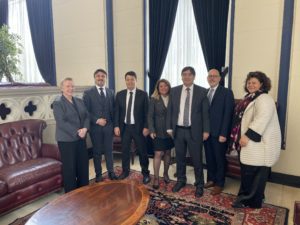CNDR Hosts High-Level Ministry of Justice Delegation from Turkey
Professionals from all over the world come to UC Law SF to study alternative dispute resolution (ADR), citing the wide selection of dispute resolution courses and the college’s international reputation among practitioners.

Photo: left to right, Prof. Sheila Purcell, Director, CNDR; Mr. Hakan Öztatar, Head of Legal Affairs, Ministry of Justice; Mr. Umut İlhan Durmuşoğlu, Chairman of Mediation Department, Ministry of Justice; Ms. Aşiyan Süleymanoğlu, Mediator/Consultant, ADR Istanbul ; Mr. Howard Herman, Director of ADR Programs, U.S. District Court, Northern District of California: Ms. Ferda Paksoy, Mediator/Interpreter, ADR Istanbul
This month, the Center for Negotiation and Dispute Resolution (CNDR) at UC Law SF hosted a delegation of Ministry of Justice officials from Turkey as the country expands its mandatory mediation programs.
Since launching a certificate program for international ADR professionals in 2011, CNDR has hosted judges, attorneys and mediator participants from more than 40 countries. Two members of the recent Turkish delegation were part of CNDR’s initial program in 2011, the International Court ADR Institute. This year marked the ninth year the certificate program has trained professionals who are designing ADR programs for their respective countries.
Sheila Purcell, Director of CNDR, said the institute provides technical assistance and serves as a clearinghouse for information on ADR practices worldwide. Purcell said that while most countries adopt voluntary mediation programs, Turkey has seen voluntary use of mediation triple since it adopted mandatory mediation for labor cases. The Ministry of Justice has recently extended the program to include commercial disputes.
This year alone, mandatory mediation was initiated in more than 88,000 commercial disputes, leading 37,000 to settle. Turkey has more than 10,000 registered mediators.
Mediation is seeing wide adoption globally. Last year, the United Nations General Assembly approved the Convention on International Settlement Agreements Resulting from Mediation, known as the Singapore Convention. Signatories will benefit from a uniform framework to enforce cross-border mediation agreements.
Turkey is one of the signatories, Purcell said. “They are hoping it will allow for more cross-border mediation, which generally helps things like trade and reduces conflict and isolation. We at CNDR are gratified to be a part of this broader global effort.”
CNDR has been recognized by U.S. News & World Report as one of the Top Ten ADR programs in the country and was the winner of the 2018 Alternative Dispute Resolution (ADR) Education Award by the Ninth Circuit Court of Appeals. Lawyers from all over the world come to UC Law SF to study ADR, citing the wide selection of dispute resolution courses and the college’s international reputation among practitioners.
The International Court ADR Institute is co-taught by Howard Herman, ADR Director of the U.S. District Court, Northern District; Claudia Bernard, Retired Chief Mediator for the Ninth Circuit Court of Appeals, and Purcell.
To request information, please email CNDR@uclawsf.edu or call 415.581.8941. Browse the newsletter, Communique, to learn more and follow CNDR on Facebook, Twitter, and LinkedIn.